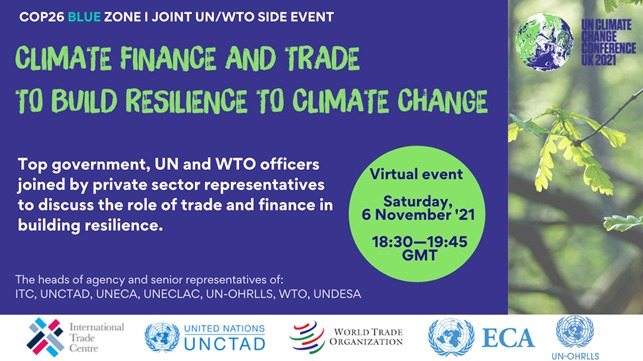COP26 Side Event- Climate Finance and Trade to build resilience to Climate Change
Área(s) de trabajo
Resumen
UN ECLAC Excecutive Secretary, Ms. Alicia Bárcena will participate in a COP26 event to discuss the importance of mobilizing climate finance and investment capital through innovative finance mechanisms, such as climate action-debt swaps and green bonds,needed to ensure that solutions are translated into practice and enhance the adaptive capacity and resilience of the most vulnerable.
Información del evento

Fecha
6 Nov 2021, 15:30 - 16:45Tipo de evento
Climate change is the key transformational and cross-cutting challenge of our times. By disrupting key economic activities, threatening food security and local livelihoods, it amplifies developmental challenges, in particular in the least developed countries (LDCs), landlocked developing countries (LLDCs) and small island developing states (SIDS). According to the World Bank, impacts are most felt at the bottom of the pyramid as climate change is expected to push 132 million people into extreme poverty by 2030. Urgent and collective action and concerted cooperation among a multiplicity of actors is not an option but a must in order to contribute to a global green transition that leaves no one behind. All actors are called to establish inclusive partnerships, identify ground-breaking solutions and mobilize climate finance to build a more equitable, resilient and greener multilateral setting.
While frequently overlooked in multilateral processes, international trade can be an integral part in building resilience and achieving the SDGs. By generating the resources needed for investment, trade can simultaneously create wealth and build resilience of the most vulnerable nations while promoting a systemic shift towards sustainable production and consumption.
In addition, mobilizing climate finance and investment capital through innovative finance mechanisms, such as climate action-debt swaps and green bonds, is also needed to ensure that solutions are translated into practice and enhance the adaptive capacity and resilience of the most vulnerable.
This session will place emphasis on LDCs, LLDCs and SIDS, which, despite their limited contribution to climate change, are on the front-line of climate hazards and on the forefront of climate ambition. In particular, the session is expected to:
- Increase awareness of the challenges from climate change faced by vulnerable countries and their small businesses doing trade;
- Showcase best practices in strengthening adaptative capacity, improving resource efficiency and tapping into new consumption trends;
- Highlight innovative finance mechanisms available to unlock investment in adaptation and mitigation action and to ensure effective access commensurate with the urgency and scale of climate hazards.
Información práctica
Day: Saturday, 06 Nov 2021
Time: 18:30—19:45 Glasgow time/ 15:30- 16:45 Santiago de Chile time (75 minutes)
Location: COP26, Multimedia Studio 3, Glen Affric, Blue Zone
Agenda
Moderator: Mr Jean-Paul Adam, Director of the Technology, Climate Change and Natural Resources Management, UNECA (in person)
Opening statements:
- Ms Rebeca Grynspan, Secretary-General, UNCTAD (virtual)
- Ms Pamela Coke-Hamilton, Executive Director, ITC (in person)
- Ms Alicia Bárcena Ibarra, Executive Secretary, ECLAC (virtual)
- Mr Courtenay Rattray, High-Representative and Under-Secretary General, OHRLLS (video statement)
Panel discussion:
- Honorable Minister Dr Lee White, Minister of Water, Forests, the Sea, and Environment, Republic of Gabon (in person)
- Ms Salma Seetaroo, CEO, Cashew Coast (virtual)
- Mr. Sheldon Mclean, Economic Affairs Officer of the ECLAC Subregional Headquarters for the Caribbean in Port of Spain
Closing statements:
- Ms Vera Songwe, Executive Secretary, UNECA (video statement)
- Mr Jean-Marie Paugam, Deputy Director General, WTO (in person)